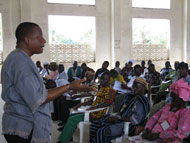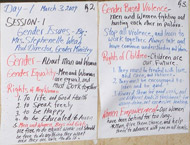In Liberia, formal and traditional systems of justice have coexisted since the founding of the state, although not always in harmony. Local chiefs, elders, and spiritual leaders have used traditional methods of administering justice for generations. From the early 20th century on, these practices were codified in executive administrative regulations that govern areas outside of Monrovia, known as the hinterlands.
From the outset of programming, The Carter Center has worked to bring a better understanding between customary and statutory laws.
The first steps in this direction involved convening trainings and dialogue opportunities to explore the differences between national laws, rural administrative regulations, and customary practices and to begin to discuss ways that national legal reform might be embraced in traditional communities.
In 2008, for example, The Carter Center helped facilitate three regional dialogues between traditional leaders and the Ministry of Internal Affairs (PDF). As a result of these dialogues, the National Traditional Council produced a resolution offering its stance on various legal issues and traditional practices. Also, with the Ministry of Justice and the U.N. Mission in Liberia’s legal and judicial office, the Center convened a lessons-learned consultation on Access to Justice in a Transitional Period (PDF).
In 2009, the Ministry of Internal Affairs, the National Traditional Council, and The Carter Center first partnered to hold county-level trainings for traditional leaders on the rule of law and gender mainstreaming in each of the 15 counties. These trainings also allowed the government to solicit input from traditional leaders on issues of legal reform and give the traditional leaders the chance to be heard on important questions that affect their lives.
At this time, the Center helped the judiciary's Committee on the Role of Non-Lawyers examine the differences between statutory laws and current administrative regulations that govern rural areas. Also, in partnership with the U.S. Institute of Peace and the UNMIL Legal and Judicial System Support Division, the Center worked with a group of senior Liberian lawyers to examine related issues. This culminated in 2010 with a National Conference on the Role of Customary Justice, co-hosted by The Carter Center in Gbarnga, and attended by President Sirleaf and the minister of justice.
Following the Ebola period, policy efforts have focused on creating a legal aid policy. A conference in early 2016 launched a draft policy document that is still under discussion. At the same time, The Carter Center is working with the Liberian National Bar Association to implement a small pro bono legal program and with the Liberian Law Reform Commission to continue work on the dual justice system. In 2017, the Center began working with the new leadership of the Liberian National Police on a nationwide “Don’t Bribe the Police” campaign.
Please sign up below for important news about the work of The Carter Center and special event invitations.
 (Click to enlarge)
(Click to enlarge)
Participants from across Liberia attend Carter Center-sponsored workshops such as this one, held in March 2009, designed to strengthen understanding of the country's rule of law.
 (Click to enlarge)
(Click to enlarge)
Sensitization workshops enable a greater understanding of citizens' rights and responsibilities under new Liberian law.